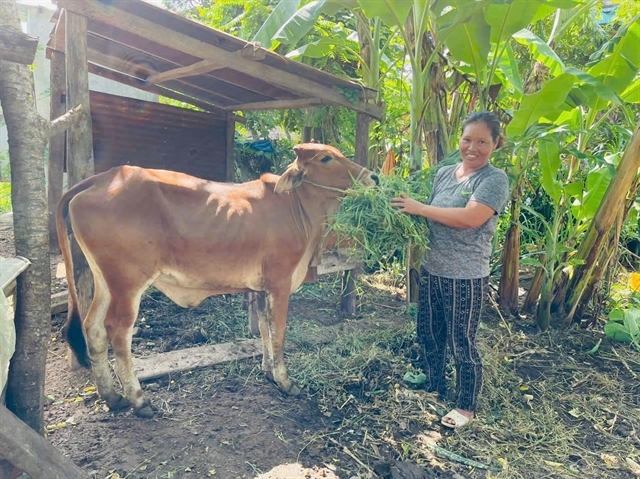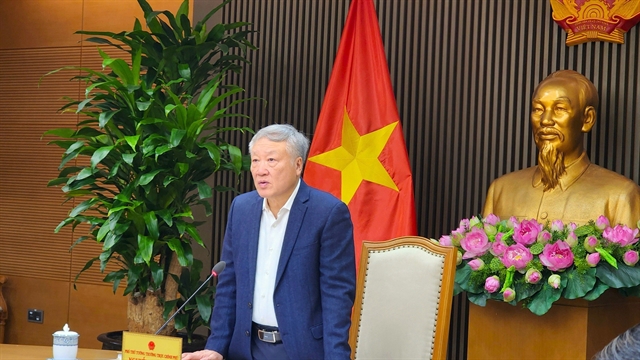 Society
Society


|
| A resident of the Central Highlands province of Gia Lai receives a cow to support her livelihood as part of the region's sustainable poverty reduction efforts. VNA/VNS Photo Hồng Điệp |
HÀ NỘI — Việt Nam plans to merge its three national target programmes on new rural development, sustainable poverty reduction and socio-economic growth in ethnic and mountainous areas into a single integrated initiative to improve implementation and investment effectiveness, officials said at a meeting on Tuesday.
The event was chaired by Permanent Deputy Prime Minister Nguyễn Hòa Bình, who leads the Central Steering Committee on National Target Programmes for 2021–2025. Deputy PM Trần Hồng Hà was also in attendance.
Addressing the meeting, Bình noted that the three national target programmes currently contain overlapping elements, prompting local authorities to propose a merger for more efficient execution. The Ministry of Agriculture and Environment (MAE) is tasked with preparing an integrated programme proposal for submission to the National Assembly (NA) during its tenth session of the 15th tenure.
The MAE and the Ministry of Ethnic and Religious Affairs will co-chair the national target programme for new rural development, sustainable poverty reduction and socio-economic development in ethnic and mountainous areas for the 2026–2035 period, said Deputy Minister of Agriculture and Environment Võ Văn Hưng.
The programme’s beneficiaries include communes and villages across the country, with priority given to especially disadvantaged ethnic and mountainous areas, poor communes and those striving to meet new rural and modern rural standards.
Poor and near-poor households, those recently escaped from poverty, ethnic families and people in underprivileged areas are the main focus of this national target programme.
Public service units involved include agencies working on ethnic affairs, educational institutions, local health centres and cultural heritage sites linked to tourism development in ethnic and mountainous areas.
The programme will be implemented over 10 years from 2026 to 2035, divided into two phases – 2026 to 2030 and 2031 to 2035.
Its overarching goal is to build modern and practical rural areas aligned with urbanisation and climate change adaptation, while developing green, circular and ecological rural economies linked to agricultural restructuring, digital transformation and innovation.
The programme aims to enhance the roles of individuals, communities and economic stakeholders while ensuring national defence, security and social order, particularly in strategic, border and island areas.
It prioritises inclusive and sustainable poverty reduction, ensuring social welfare, gender equality and improved incomes as well as living standards and access to basic services for citizens.
Under the programme, ethnic and mountainous areas are expected to see comprehensive growth, narrowing the development gap between regions, strengthening national unity and preserving the cultural identity of ethnic communities.
By 2030, the programme targets a rural per capita income increase of 2.5 to three times that of 2020, with the income of ethnic communities reaching half the national average. The national multidimensional poverty rate is expected to decrease by 1 to 1.5 per cent annually.
By 2035, rural per capita income is projected to grow by at least 1.6 times compared to 2030, with ethnic community income rising to two-thirds of the national average. The multidimensional poverty rate will continue to steadily decline based on the poverty criteria set for 2031–2035.
Speaking at the meeting, Deputy PM Hà said that the unified programme will deliver better results in rural development and socio-economic progress in ethnic and mountainous areas.
He urged the programme lead, the MAE, to refine and clarify the programme’s goals so that local authorities can focus on implementation. The targets should include prioritising investment in culture, healthcare, education, poverty reduction and disaster mitigation in the most difficult areas of the country.

|
| Permanent Deputy Prime Minister Nguyễn Hòa Bình addresses the meeting on proposing a unified programme on new rural development, sustainable poverty reduction and socio-economic growth in ethnic and mountainous areas on Tuesday. — VNA/VNS Photo Chu Thanh Vân |
Reiterating that the Party and State's ultimate goal is to ensure prosperity for the people and the country, Permanent Deputy PM Bình noted that integrating the programmes does not mean reducing support policies for ethnic communities, but rather enhancing them across different aspects.
He explained that poverty remains prevalent among ethnic communities, and therefore poverty reduction efforts must focus heavily on these areas.
While new rural development is implemented nationwide, the general standard of living has improved, meaning investments should be concentrated on ethnic communities and the most disadvantaged regions.
The unified programme can be seen as a way to increase support for the most underprivileged areas. It is set to run through 2035, with tentative plans for additional support policies thereafter, said Bình.
He praised the MAE for its proactive and prompt preparation of the programme proposal as directed by the Government. He instructed the ministry to incorporate feedback to finalise the proposal, ensuring it focuses on key priorities and pivotal issues.
“The programme’s objectives and content must not overlap with other programmes or regulations. Its missions should be clear, straightforward and feasible, ensuring the programme achieves higher and better results than before,” said Bình.
The finalised proposal will be submitted to the NA for review. Once approved, ministries, agencies and localities must focus on effectively implementing the programme, addressing any limitations or obstacles encountered in the past, he said. — VNS